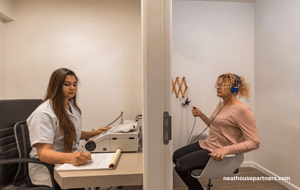Navigating Hand Issues in the Construction Industry: A Health & Safety Guide for Employers
Navigating Hand Issues in the Construction Industry: A Health & Safety Guide for Employers
James Rowland
Commercial Director James leads Account Management, Sales and Marketing at Neathouse Partners.Date
06 September 2023Updated
20 March 2024
Table of contents
Related articles
Tags
If you're an employer in the construction industry, this guide is for you.
Your employees work hard, but their hands work harder, making them vulnerable to various skin and hand conditions.
Not only do these problems affect the well-being of your staff, but they can also have serious implications for your business.
As you will know, under UK legislation, employers have a responsibility to ensure a safe and healthy working environment, as outlined in the Health and Safety at Work Act 1974.
Here are some actionable tips to help you to ensure your employee's hands remain healthy and able to carry out the tasks they need to.

Why Hand Health Matters
You might not realise it, but the skin is the body's largest organ, acting as a frontline defence against bacteria and other potential infections.
Keeping hands healthy isn't just a growing trend among modern men—evident from a £24.4 billion market value in 2021, it's vital for both male and female workers in construction.
This industry is predominantly male, making up 85% of the workforce.
But regardless of gender, improper personal protective equipment (PPE) can lead to hand issues that disrupt productivity and pose health risks.
Further reading: Safety in construction: A snapshot for employees
Risks and Realities
Hand-Arm Vibration Syndrome (HAVS) and Other Occupational Diseases
Regular use of vibrating tools like chainsaws or pneumatic drills may lead to conditions such as HAVS or Carpal Tunnel Syndrome.
In the UK, these are some of the most commonly prescribed conditions under the Industrial Injuries Disability Benefit scheme and tips to avoid this include:
- Using low-vibration tools
- Employing additional PPE like anti-vibration gloves or wrist braces
- Implementing 10-minute break intervals and hand-warming procedures
Contact Dermatitis
This condition accounts for about 80% of work-related skin issues.
Once your employees develop an allergy, their skin could be sensitised for life, potentially causing them to miss work or require role adjustment.
The Control of Substances Hazardous to Health (COSHH) Regulations 2002 require employers to take steps to control such exposure.
Employers should:
- Provide proper-fitting PPE
- Educate staff on regular moisturising routines
- Consult healthcare providers for medicated creams when necessary
The Bottom Line for Business
Failing to address hand issues not only jeopardises the health of your employees but also has tangible business consequences.
Lost work hours, compensation claims, and lowered productivity can significantly impact your bottom line.
Additionally, neglecting employee health can result in reputational damage and even legal repercussions under UK regulations.
Practical Tips for Employers
- Regular Moisturising: Encourage employees to apply moisturiser regularly to their hands and feet. Opt for lightweight, non-greasy lotions.
- Foot Care: Advise the use of hydrating lotions and foot scrubs to prevent painful conditions like hyperkeratosis, especially for those spending long hours on their feet.
- Sun Protection: Stress the importance of sunscreen with at least SPF 30, especially for outdoor tasks, to prevent occupational skin cancer, which has seen rising numbers in the construction industry.
Legal Implications and Employer Responsibility
As an employer, it's crucial to understand that you're legally bound to ensure a safe work environment.
Under the Health and Safety at Work Act 1974, you are required to protect your workers from health hazards, including occupational skin disorders.
Failures in compliance could result in hefty fines or even legal action.
The Employment Rights Act 1996 also entitles employees to leave for sickness, which could be triggered by untreated hand issues.
Employee Training and Awareness
Equally important to providing the necessary PPE is educating your workforce.
Workers should be made aware of the risks involved with their daily tasks, along with how to use PPE effectively and when to take breaks.
Proper training not only aligns with best practices but also helps in fulfilling your duties under the Management of Health and Safety at Work Regulations 1999.
Monitoring and Record-Keeping
Keep meticulous records of any reported hand and skin issues, actions taken, and PPE supplied.
This record-keeping is not just good practice; it's a requirement under RIDDOR (Reporting of Injuries, Diseases and Dangerous Occurrences Regulations 2013).
Proper documentation can serve as your due diligence in the case of legal scrutiny.
Review and Update Safety Protocols
Lastly, your commitment to employee health should not be a one-time affair.
Regularly review and update your safety measures to incorporate new research findings or better equipment.
Engage in periodic risk assessments as stipulated by the Management of Health and Safety at Work Regulations 1999.
Final Thoughts
By adhering to the measures outlined in this guide, you're not only ensuring compliance with UK legislation but also investing in your employees' health, which, in turn, boosts productivity and company morale.
fter all, a healthy worker is a happy worker, and a happy worker is good for business.
Related blog posts

Understanding LOcHER and Its Importance for Health and Safety

Do I Need To Screen My Staff For Hearing Loss?
Have questions?
Get in touch today
Contact us, and our team will get back to you within 24 hours. We value your questions and are committed to getting them answered quickly.


Hello! I am Nicky
Just fill in the form below with your details, and I will arrange for a member of our team to give you a call.
By clicking, you agree to our Privacy Policy







